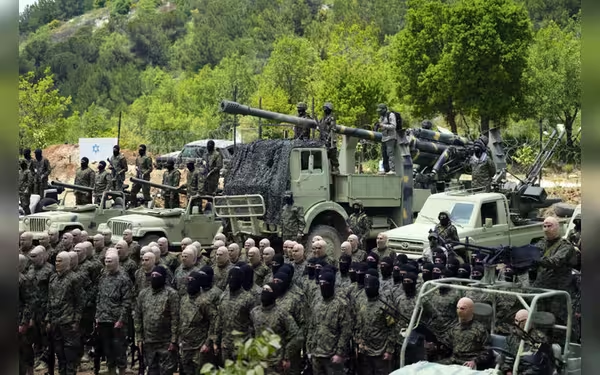Saturday, November 16, 2024 03:21 PM
US Military Posture Unchanged Amid Rising Violence in Middle East
- US military posture remains unchanged despite regional tensions.
- Recent Israeli attacks in Lebanon have caused significant casualties.
- Concerns grow over potential expansion of Israel's military operations.
 Image Credits: arabnewspk
Image Credits: arabnewspkUS military posture remains unchanged amid rising violence in the Middle East, with significant casualties reported in Lebanon.
In recent days, the Middle East has witnessed a surge in violence, particularly with deadly Israeli attacks in Lebanon targeting Hezbollah's communications equipment. These attacks have resulted in significant casualties, with reports indicating that 37 people have lost their lives and around 3,000 have been injured. This situation has overwhelmed hospitals in Lebanon and has raised alarms about the potential for a broader conflict in the region.
The Pentagon has responded to inquiries regarding the United States' military posture in the Middle East, asserting that there are no changes at this time. Pentagon spokesperson Sabrina Singh emphasized, "I am not tracking any force posture changes in the Eastern Med or in the Central Command area of responsibility." This statement comes amid rising tensions and fears of escalation following the recent violence.
Singh further noted that any actions that heighten tensions in the Middle East are not beneficial. She stated, "In pretty much every call the secretary always reiterates the need (that) we want to see regional tensions quell." This reflects the U.S. government's ongoing desire to prevent a wider regional conflict, especially in light of the ongoing war in Gaza, which has already resulted in a humanitarian crisis.
Israel has not officially commented on the attacks in Lebanon, although security sources suggest that they may have been executed by the Mossad, Israel's intelligence agency. The situation remains precarious, with the Pentagon being questioned about the possibility of a ceasefire deal in Gaza. Despite the escalating tensions, the U.S. maintains that the conflict is currently contained to Gaza.
President Joe Biden had previously proposed a three-phase ceasefire plan for Gaza, but this initiative has faced numerous challenges. Critics have urged the U.S. to leverage its military support for Israel to encourage a resolution, yet the U.S. continues to stand firmly by its ally.
The recent attacks in Lebanon have sparked concerns about the potential expansion of Israel's military operations, which have already resulted in tens of thousands of deaths and a severe humanitarian crisis in Gaza. Allegations of genocide have also been raised at the World Court, which Israel vehemently denies. The backdrop of this violence traces back to a deadly attack by Hamas on October 7, which has since escalated into a full-blown conflict.
As the situation unfolds, it is crucial for the international community to remain vigilant and engaged. The complexities of the Middle East conflict require careful navigation to prevent further loss of life and to seek a path toward peace. Understanding the dynamics at play is essential for fostering dialogue and finding sustainable solutions that prioritize human rights and humanitarian needs.













